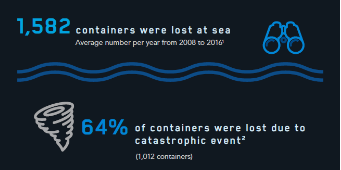
Transporting goods around the world is not without certain risks. And if you’ve ever shipped something internationally, you realize just how many things could go wrong while goods are in transit. That’s where cargo insurance comes in.
Protecting freight against loss
You can’t always protect your freight from loss. In fact, the number of containers lost at sea each year is staggering.
The good news is insuring your goods can protect the value of your goods against potential losses that can happen while in transit during air, ocean, and rail shipments.
All too often, shippers misunderstand how liability works in the event of loss to their goods. And the various rules and regulations surrounding the topic can make things even more complicated. To clear up these confusions, this post will explain key cargo insurance information and how it can help mitigate your shipping risks.
What is cargo insurance?
Marine cargo insurance is the most common method used to protect the value of your goods from physical damage, theft, or general average. Cargo insurance is not always automatically included for all shipped goods—this often varies by region. Instead, shippers or consignees can purchase policies in the insurance market from niche providers, large brokers, local agents, websites, and freight forwarders.
I often compare cargo insurance with car insurance. You pay for insurance coverage on your car because accidents and theft happen. You simply can’t always plan or avoid these types of things. Even after years of no problems, you’re still willing to cover your car. After all, getting only the most basic coverage could leave you out a lot of money in the eventuality that an accident did occur.
It’s the exact same principle with cargo insurance. By choosing to pay a small fraction of the value of your goods, you’re protecting yourself for the day that the unexpected happens.
Is cargo insurance a requirement?
There is no requirement to buy cargo insurance. However, it is highly recommended so you can better protect your goods from exposure to risks—some that could be catastrophic. It’s important to weigh the insurance costs with the potential losses and collateral damage that could occur without insurance.
Keep in mind that even if you prove an ocean carrier is legally liable, their limit of liability is $500.00 USD per package or customary shipping unit, or the actual value of the goods, whichever is less. And air freight carriers are only liable for 19 SDR per kilo (around $24.00 USD). As you can imagine, most freight has a much higher value than these rates. Therefore, without the proper insurance, you could lose a big part of the value of your cargo
Who is liable for damage?
Some of the most common types of damage are outside a carrier’s liability, including fire, acts of God, strikes, accidents of the sea, insufficiency of packing, and more. With these regulations in place, proving a carrier is legally liable for your freight can be difficult.
Next to that, there are many companies handling your freight throughout storage and transit. It can make it difficult to trace where damage occurred or prove who is liable for said damage. With a cargo insurance policy, you are covered for these losses and don’t need to prove liability.
What is general average?
If a marine carrier experiences a fire or some other extraordinary sacrifice or expenditure occurs, the carrier may declare general average. If this happens, all those who have cargo on the ship may be required to share in the cost of the expenditure.
If an ocean carrier declares general average and your cargo was on the ship, your cargo will not be released until the salvage security and general average deposit are calculated. This can take weeks and be quite costly. For example, I had a customer several years ago that had to pay close to $50,000 USD simply to release their cargo from the container. The freight was only valued at $100,000 USD.
Can I make a trade deal with my buyer or supplier?
Simply making a trade deal with buyers or suppliers may not be enough coverage. Under cost insurance and freight (CIF) terms, they are only obligated to provide minimal coverage. If you choose to pursue this type of coverage, always closely examine their policies to make sure your cargo is sufficiently covered.
Top 3 qualities to look for in a quality cargo insurance provider
Many companies out there will offer cargo insurance. But finding the right one for your business may take some research. Just because an insurance provider has the highest rates doesn’t always guarantee the best coverage. You need a provider who cares about your freight. That’s why C.H. Robinson works hard to provide:
- The right cargo insurance provider will offer a variety of flexible policies based on your needs. And with low or no deductibles.
- All-risk coverage. Find a provider who can coverage all of your standard commodities against financial exposure, physical loss, or damage while your goods are in transit.
- Qualified insurance teams. With plenty of insurance experts to guide you through the purchasing and claims process, great cargo insurance providers help you navigate the complicated rules and regulations to quickly resolve claims.
Protect the value of your goods
This is just a quick overview of why cargo insurance is critically important for your freight. Download a free copy of our white paper, Global Shipping: Protecting the Value of Goods, for even more information about cargo insurance.
In need of cargo insurance now? Connect with one of our cargo insurance experts to find out if our cargo insurance services are available in your region.
- Average number per year from 2008 to 2016. Source http://www.worldshipping.org/news/articles/2017/07/10/containers-lost-at-sea-2017-update
- Source http://www.worldshipping.org/news/articles/2017/07/10/containers-lost-at-sea-2017-update
The information in this blog has been compiled with the greatest possible care; however, no rights whatsoever can be derived from its contents. C.H. Robinson does not guarantee, warrant, or represent the accuracy, completeness, or fitness for a particular purpose of the information contained herein.



